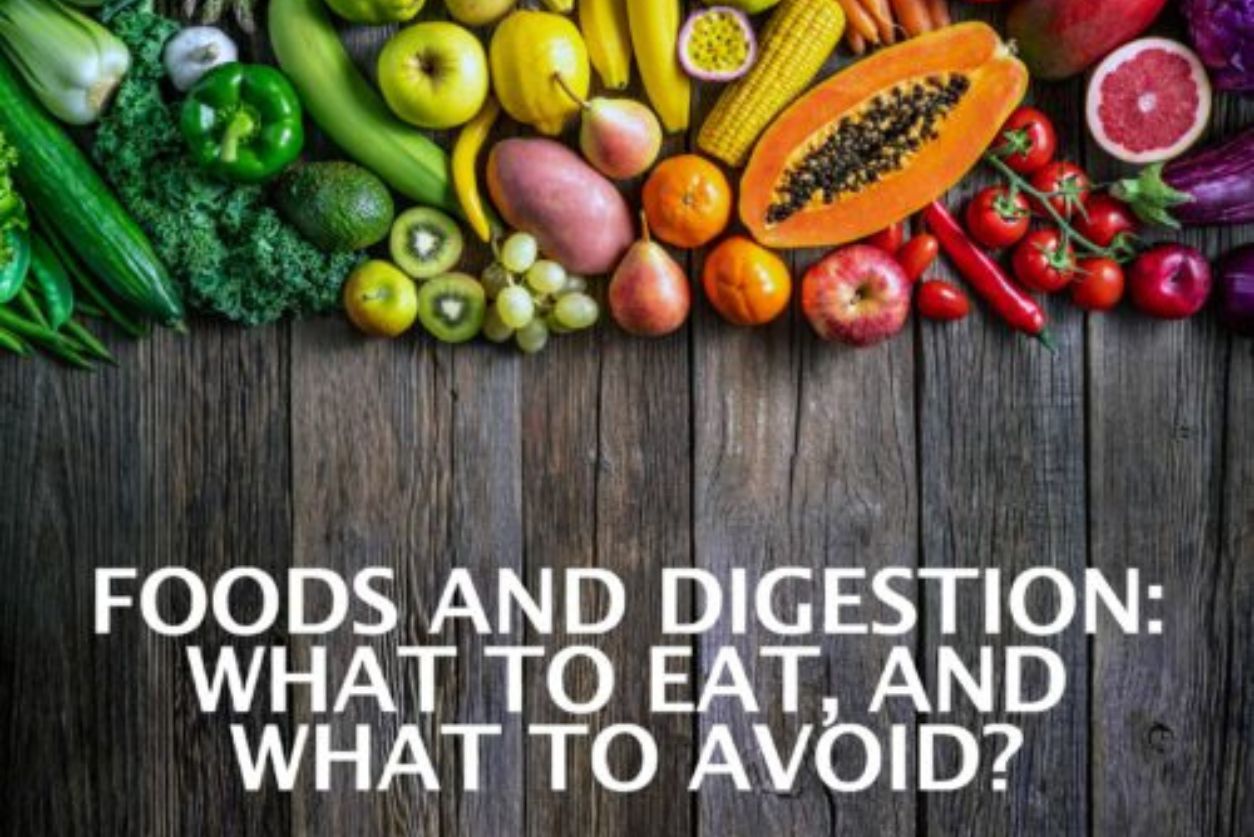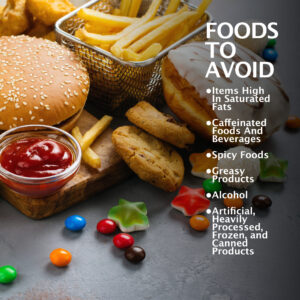
Foods And Digestion: What to Eat, And What to Avoid?
Digestion is among the most crucial processes your body performs using the foods you consume.
Not all foods digest the same way. Certain foods stimulate and speed up the digestive process. Unfortunately, other foods delay and even disrupt your digestive system. The trick to healthy digestion is knowing which items produce favorable and disagreeable results.
Digestive Tract Overview
You probably do not pay much attention to what happens to your food after you eat it. Digestion is an intricate process involving many organs carrying out very specific functions.
Digestion starts inside the top part of your digestive network – the upper gastrointestinal or upper GI tract.
Food enters your mouth where your teeth break what you eat into pieces small enough to fit into your esophagus. The esophagus is a long, tube-like structure that takes food into your stomach. Once inside the stomach, food mixes with digestive juices.
Eventually, the stomach produces a substance called chyme – a combination of digested food and other materials. Chyme is then slowly moved into the upper region of your small intestine (the duodenum).
After exiting the duodenum, chyme travels into the lower GI system where it enters the middle and lower components of the small intestine (the jejunum and ileum, respectively).
The movement of digested products is called peristalsis. The lower small intestine’s role is to absorb liquids like water and nutrients from foods into your bloodstream and send waste products into your large intestine (the colon).
Once your colon receives waste materials, it transforms it into stool. Eventually, peristalsis pushes stool into your rectum to ultimately be expelled through your anus during bowel movements. Though not directly involved in the peristaltic procedure, the liver and pancreas contributions to digestion cannot be overlooked. These organs execute critical functions, such as releasing hormones needed to stimulate peristalsis, processing waste products, and creating important digestive juices.
The Reason Food Is Vital
Few activities are more satisfying than enjoying a hearty meal when you’re hungry. Food is paramount to your health and ultimate survival. The products you consume contain nutrients. These chemicals provide the body’s systems with the energy they need to perform at optimal levels.
Nutrients are divided into certain categories. Macronutrients are carbohydrates, such as starches, sugars, and fiber, fats, and proteins. Your diet requires large quantities of them to remain strong and healthy.
You must also consume micronutrients. These are differentiated into subheadings like minerals and vitamins. Important minerals include:
- Iron.
- Magnesium.
- Zinc.
- Iodine.
- Copper.
Your diet should also contain discernible concentrations of Vitamins A, C, D, and the chemicals comprising the Vitamin B complex.
Dangers Of Poor Digestion
If you do not consume the right products, you could experience poor digestion. Over the short term, this might cause symptoms such as:
- Abdominal cramping.
- Gas.
- Burping.
- Flatulence.
- Constipation.
- Diarrhea.
- Bloating.
- Heartburn.
Continued inadequate digestion can lead to more serious health consequences like malnutrition and a host of systemic illnesses. Researchers have concluded that many potentially severe health concerns like diabetes, various forms of cancer, and immune system disorders can be traced back to a weakened or malfunctioning digestive network.
Foods Favorable to Digestion
Diet specialists and doctors suggest that foods favorable to digestion are simple products containing large quantities of important nutrients. They should be low in substances like synthetic chemicals, artificial nutrients, and significant amounts of possible health-impacting materials, such as unhealthy fats, salt, cholesterol, and sugar.
You should be consuming large amounts of:
- Fiber: Fiber is vital to digestive system function. Scientists have found that it strengthens the cells in your large intestine. It keeps the digestive system operating smoothly and effectively. Fiber consumption also leads to the development of soft, easy-to-pass stools. High-fiber foods include beans, lentils, produce products, artichokes, barley, and grain products.Sauerkraut: Fermented cabbage contains large sums of probiotics. These substances are considered good bacteria. Your gut has millions of bacteria comprising what is known as gut flora. A friendly gut flora exists when the good organisms outweigh the potentially harmful particles. Maintaining this balance requires consuming items with quantities of probiotics or augmenting your diet using probiotic supplements.
- Yogurt: Researchers have found that yogurt contains probiotics. The product is light and easy for the digestive system to process.
- Fish Oil: Fish oils found in sea creatures like salmon contain measurable amounts of Omega-3 fatty acids. Researchers have discovered that these chemicals reduce inflammation along the lining of digestive network components like the stomach and large intestine. Taking fish oil can result in fewer incidents of gas, bloating, flatulence, abdominal cramping, and other uncomfortable occurrences.
- Ginger: This ancient Asian-originated spice has been widely used to improve digestion or relieve digestive problems for centuries. Scientists maintain that the material proves effective in such efforts because of its capacity to increase the speed by which food travels from the stomach into the small intestine. Ginger can be purchased as a spice or found in commonly consumed products like ginger ale.
- Water: Water is often an overlooked ally to digestion, but liquids support the digestive tract’s ability to move goods quickly and efficiently.
Foods To Avoid
Doctors and nutritionists suggest you avoid digestion-limiting foods, including:
- Items High in Saturated Fats: Edibles like cheese and cream can contain significant levels of saturated fats. These products are heavy and take longer for the digestive system to process.
- Caffeinated Foods and Beverages: Caffeinated foods and beverages, especially coffee and soft drinks, should be consumed sparingly, if at all. Caffeine is a powerful substance capable of irritating the stomach lining. This can precipitate short-term symptoms like indigestion and heartburn, and potentially more serious long-term problems like gastric ulcers.
- Spicy Foods: Heavily spiced foods or naturally spicy substances like hot sauce or cayenne pepper are abrasive and can irritate the digestive tract lining.
- Greasy Products: Greasy items like fast food and pizza contain large fat concentrations.
- Alcohol: Like caffeine, alcohol is particularly abrasive and capable of precipitating severe gastric irritation. Alcohol contains other potentially harmful chemicals.
- Artificial, Heavily Processed, Frozen, and Canned Products: These foods often have heavy concentrations of preservatives, chemicals, and salt that can cause inflammation and other negative symptoms.
Digestion Aiding Habits
Besides consuming digestion-friendly and limiting or avoiding digestion-inhibiting edibles, you are encouraged to adhere to other digestion-supporting tips such as:
- Establishing a Consistent Meal Schedule: Consume both regular meals and snacks following an established schedule that is followed each day. This trains your digestive system and makes digestion simpler and more manageable.
- Keeping Stress in Check: Consistent, significant stress can negatively influence the digestive tract and often overstimulate its function. This often results in many unpleasant symptoms. Identify and participate in any enjoyable, productive stress-relieving activities.
- Exercising: Routine physical activity keeps your digestive tract operating properly. Exercise helps you maintain a healthy weight, which is critical to optimal digestive function.
Reaching Out to Us
If you are experiencing any gastrointestinal issues, please contact us. Our practice began more than 15 years ago and has emerged as one of the leading gastroenterology practices in central Florida. We perform a host of diagnostic procedures using state-of-the-art equipment in a friendly, comfortable, and inviting atmosphere where patient care is always a top priority. Contact us today!
